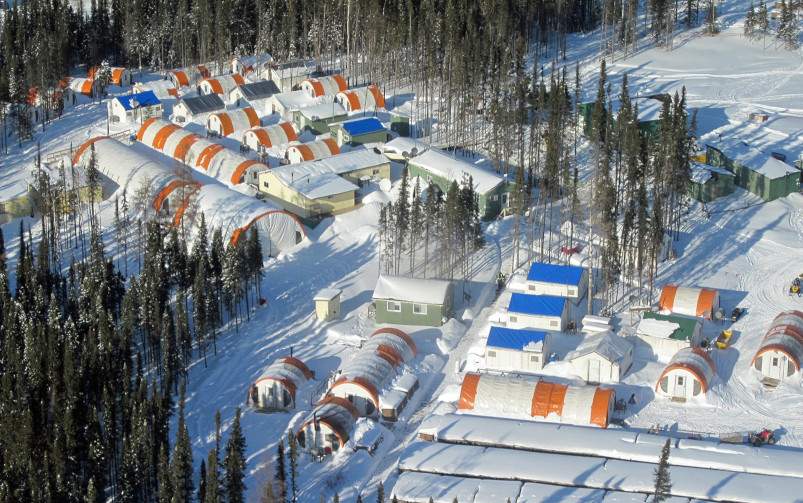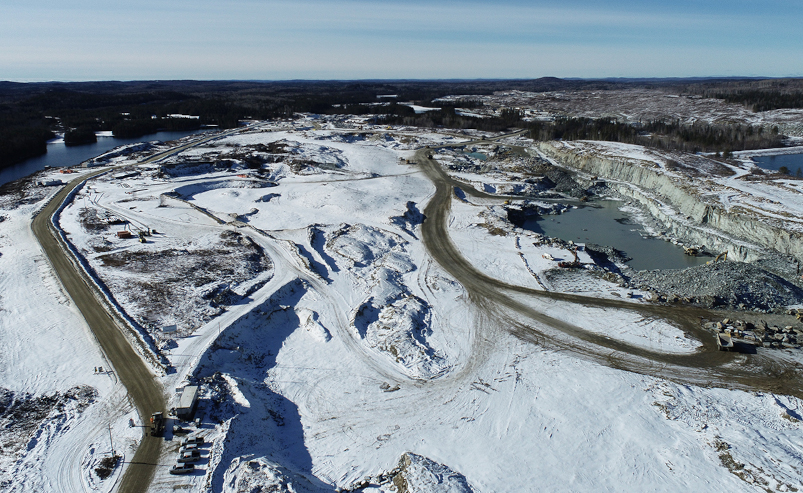Equinox Gold suspended operations at its Los Filos mine in Mexico due to "illegal blockades" at the mine. Courtesy of Equinox Gold.
Welcome back to your weekly mining news recap, where we catch you up on some of the news you may have missed. This week we have stories about tailings storage facility compliance in British Columbia, a blockade at Equinox’s Los Filos mine, and Western Copper and Gold releasing its latest assessment for the Casino project.
A new report from Wood Mackenzie indicates that more action is required on the part of the gold industry to meet and surpass the 1.5 degree Celsius climate benchmark outlined in the Paris Agreement, Mining.com reports. The report estimated that the gold industry emitted over 55 megatonnes of CO2 equivalent in 2019, and though this is small compared to other industries in the energy sector, Wood Mackenzie’s head of gold research Rory Townsend said there is still more work to do: “It is apparent that some mines have a lot more ground to cover than others. Those that are beholden to carbon-intensive grids could struggle unless the process to approve onsite renewable alternatives accelerates markedly.”
Mining executives in West Australia have issued an apology to victims of sexual assault and harassment on the state’s mining sites, ABC News reports. Managers from Rio Tinto, BHP, FMG and Woodside said they had a “zero tolerance policy” on assault and harassment, in light of two BHP workers being charged with sexual assault in two separate incidents.
Glencore may restart its Mutanda copper-cobalt mine after suspending it in August 2019 due to low cobalt prices, Mining Global reports. Executives met with the Democratic Republic of the Congo’s Mines Minister Antoinette N’Samba Kalambayi to discuss the restart of its Mutanda operation. In 2018, its last full year in operation, Mutanda produced 199 kilotonnes of copper and 27.3 kilotonnes of cobalt.
Western Copper and Gold has released a preliminary economic assessment for its Casino project in Whitehorse, Yukon. The PEA for the gold, silver and copper open-pit project estimates an after-tax NPV of $2.3 billion with an eight per cent discount and a life of mine of 25 years, processing 1.3 billion tonnes of mineralized material. The PEA also examined the possibility of extending the operation into a second phase, which would look to process another one billion tonnes of ore from the mine over an additional 22 years.
An audit by British Columbia’s chief auditor of mines found that over one in four tailings storage facilities (TSF) were not compliant with the province’s newly revised code requirements, CTV News reports. The audit, which looked at over 60 TSFs, also found that the Mines Ministry in the province is not consistent in its approach to non-operational TSFs in contrast to operating ones, and that the ministry does not have sufficient resources to inspect all TSFs.
BHP Group’s CTO Laura Tyler said the company plans to nearly double exploration spending for base metals within the next five years. Its current annual exploration budget is between US$70 million to US$80 million, excluding outlays for early-entry joint ventures, Reuters reports. The company is also relocating its global exploration head office from Santiago, Chile to Toronto, a move which Tyler said will allow the company to be “closer to the action.”
Kinross Gold gave an update on the temporary suspension of milling at its Tasiast mine following a fire on June 15, confirming that there were no injuries, and that mining activities have resumed along with construction work at the Tasiast 24k expansion, Kitco reports. The company also revised its 2021 production guidance to 2.1 million gold equivalent ounces, down 300,00 ounces from its February 10 disclosure of 2.4 million ounces.
Strikes and protests surrounding the Jeffrey asbestos mine in Asbestos, Quebec in 1949 set off a chain reaction leading to the massive cultural shift known as Quebec’s Quiet Revolution. Attention to the protests also provided an opportunity for future Prime Minister Pierre Elliot Trudeau to increase his political presence through support of the cause in his journal Cité Libre.
Training partnerships between mining companies and Indigenous communities have seen positive results for both labour-starved companies, and Indigenous communities seeking employment opportunities. These partnerships also help to harmonize relationships between two groups that have historically had a tense and sometimes adversarial relationship, while increasing the pool of skilled labour living close to many mining sites.
Equinox Gold reported in a press release that it is temporarily suspending mining activities at its Los Filos mine in Mexico. The report states that this is due to “illegal blockades by a unionized employees and members of the Xochipala community,” who are both allegedly “demanding payments in excess of their contractual agreements.” The brief release concluded with the statement that Equinox is working to achieve a “long-term solution that will allow the mine to operate effectively.”
Editor's note: In last week’s Recap, it was unclear that the workers returning to Agnico Eagle's Nunavut operations were Nunavut residents and that the mine had been continuously operating since those workers had been sent home last spring. We apologize for the error.
That’s all for this week! If you’ve got feedback, you can always reach us at editor@cim.org. If you’ve got something to add, why not join the conversation at our Facebook, Twitter or LinkedIn pages? Like your recap with a few more gifs? Check out our mining news recap stories on our Instagram.
Go Habs Go!




